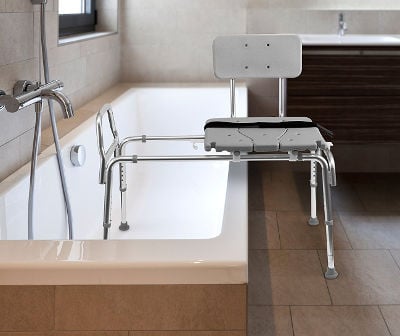 Alzheimer’s disease affects more than five million Americans, and this number may continue to grow over time. An American develops this degenerative brain disorder every 65 seconds. This health condition takes a toll on patients lives as well as to their family. It limits them from performing daily tasks, like bathing and dressing.
Alzheimer’s disease affects more than five million Americans, and this number may continue to grow over time. An American develops this degenerative brain disorder every 65 seconds. This health condition takes a toll on patients lives as well as to their family. It limits them from performing daily tasks, like bathing and dressing.
As a caregiver, whether you’re a professional or a family member, it’s important to understand how to assist a patient in their daily life. Bathing, for instance, can be one of the challenging tasks for them. They can get into an accident without proper assistance.
Preventing Seniors from Performing Daily Tasks
Alzheimer’s symptoms include memory loss, which makes it difficult for patients to complete simple tasks. They may also suffer from other challenges like difficulty in concentrating and thinking. The disease can limit their ability to multitask, too.
Since Alzheimer’s is a progressive disease, you may notice significant changes in the patient’s personality and behavior. Patients may experience depression, irritability and aggressiveness, and delusions, among others.
It may become more challenging to provide care to patients during the late stage of Alzheimer’s. You need to be patient and gentle to help them live a comfortable life despite their condition.
A Caregivers Guide for Bathing Alzheimer’s Patients
Bathing can be a confusing task for patients with Alzheimer’s. Some patients may guard their privacy and not want to get help. As a caregiver, you need to make the patient feel comfortable during the process. You may play soft music to help them relax.
Investing in bathroom assistive devices can enhance the safety of a patient. For example, the bathroom must have sturdy shower chairs, rubber bath mat, and safety bars in the tub. Even with these devices, you’ll still need to practice safety precautions:
- Never leave a frail person alone in the shower
- Before the patient gets to the bathroom, the temperature of the water should be right for the patient
- The soap, shampoo, washcloth, and towels should be ready, so you don’t have to go out and get them in the middle of the bath
- As much as possible, don’t use bath oil because it can make the tub slippery
- When you’re bathing the patient, put a towel over the person’s shoulders or lap to make them feel less exposed
- Talk to the patient about other things to distract them, especially when they get upset
The bathing process may vary depending on the condition of a patient. Always consider a method that’s comfortable and convenient.
 Making Your Bathroom Safe for Seniors
Making Your Bathroom Safe for Seniors
Your bathroom must be safe for seniors with Alzheimer’s. They should be able to use it comfortably with minimal risks of slip and fall. A variety of devices can make this everyday task easier, even enjoyable for your loved one.
Here at 1800wheelchair.com, you can find different devices that can improve the safety in your bathroom. We offer commodes, bathroom wheelchair, shower accessories, and more. We design our products to address the needs of people who struggle to bathe or use the toilet on their own.
These devices also reduce the stress that caregivers and family members may experience.
To know more about our products, contact us today or explore our online store.
